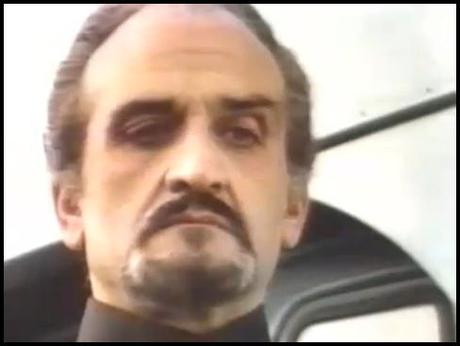Written by Robert Holmes
Directed by Barry Letts
First things first: who came up with this title? Because it sets up expectations for the serial that are just plain unfair to the material. At no time are the Autons presented in this episode actually terrifying. If anything, they are terribly silly. The best moment in the entire episode is when an Auton goes tumbling down a mountain, clearly much longer than the stuntman expected, yet gets right up on his feet at the end to resume the chase, still in character!

No, compared to “Spearhead From Space”, these Autons are just window-dressing, and poor window-dressing at that. The story is really about the arrival of the Master, played with panache by Roger Delgado, and how this new adversary reveals more about the Third Doctor.
Unfortunately, that means setting up a scenario for the Master that doesn’t really make him look very good at the end of the day. His plot with the Autons just doesn’t make much sense. The plot is so byzantine, so overly complicated, that it’s sure to fail. Even the Doctor notes this at one point: if the plan was to simply wipe out humanity, there were much more efficient ways to do so.
The point of the serial is only clear at the very end, when we see something out of the Doctor that has, previously, been missing: anticipation of future challenges. Let’s think about this for a moment: the Master nearly killed half a million people, his plan was barely thwarted, and the Doctor seems eager to have another such scenario play out so he can best the Master yet again.
Therein lies the heart of the story: the revelation that the Doctor has, in the Master, an adversary that brings out the worst in him. I’m not at all convinced that the Master really wants to kill the Doctor. I think he enjoys testing the Doctor far too much for that. Similarly, the Doctor’s hubris is such that he wants someone like the Master to test him, so he can be challenged properly (from his perspective).
It’s very much a Holmes/Moriarty analogue. Dealing with human ignorance or alien threats to Earth is one thing. Most of the time, the Doctor acts like it’s almost beneath him to operate on a human level. But the Master is a Time Lord; he’s practically an equal. For someone with so much pride in his genius, there can be no better opponent. And, as recently noted on the series finale of “Smallville” (of all places), a hero is measured by the scale of the villainy he overcomes.
Which is why the short-sighted nature of the Master’s plan is irritating. For much of the story, I couldn’t figure out why the Master would use the Autons as the players in his game. At the end of the day, should they win, what would the Master gain from it? Besting the Doctor is one thing; cultivating a threat to one’s existence is another. The Master’s eventual decision to turn against the Nestene is therefore predictable, making the abrupt nature of his decision all the more damning.
Which leads to another shortcoming: the length of the story. Many of the classic serials tend to be overly long, padded to the hilt, when the story could be better told in less time. This is a rare example of the very opposite. The story races along so fast that there’s barely any time to internalize the threat. The editing is incredibly choppy, with scenes ending abruptly to fit everything in. This also means that the usual character exploration is generally absent, which further deepens the problem of murky motivations.
I’m also not entirely taken with Jo Grant as the new main companion. I didn’t particularly like Liz Shaw, but that was more of a writing problem: for all that they talked up her scientific skills and strong personality, she wasn’t given that much to do. Jo is a step backwards, having little to no actual practical skills to work with and a certain lack of common sense. As cute as she may be, it’s perfectly understandable why the Doctor would be vexed at having her as a replacement for someone far more capable.
Which leads me to another observation: from what I gather, a lot of fans think the Doctor is a bit over the top with his attitude and arrogance in this story. But I beg to differ. Not only is the Doctor still reeling from his experiences in “Inferno”, but he’s clearly frustrated with his exile, his lack of progress on the TARDIS repairs, and the changes being forced upon him. Given his established lack of patience, I think he’s perfectly in character.
I still enjoy the Brigadier, even if I acknowledge that he’s less well-rendered in this story than those of Season 7. As far as Mike Yates is concerned, I just don’t think we see enough of him in this story to get a feel for the character. They play him as a bit of a lad, hitting on Jo rather obviously, but there’s not much else to work with yet.
I can see why this is a beloved story; the introduction of the Master alone is worth taking the time. But I also think it’s a real mess, especially coming on the heels of “Inferno”. I said before that “Inferno” could easily be remade as a two-part epic for NuWho with little alteration needed. In this case, I predict doing the same would result in panning across the board. And that’s why this fails for me: if “Doctor Who” is said to succeed on story, this just doesn’t meet the standard. (Never mind the part where a plastic chair kills a man!) I’m definitely looking forward to “The Mind of Evil” a lot more.
Writing: 1/2
Acting: 2/2
Direction: 1/2
Style: 1/4
Final Rating: 5/10

